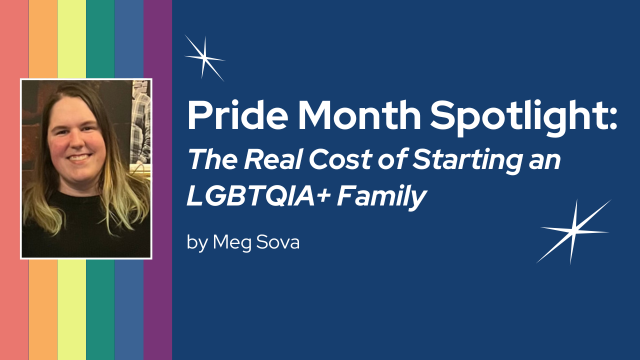Pride Month Spotlight: The Real Cost of Starting an LGBTQIA+ Family
By Meg Sova
Building a family is a beautiful and deeply personal journey, but for many in the LGBTQIA+ community, that journey often comes with complex challenges — and significant costs — that extend far beyond the national average of raising a child in the U.S. (estimated at over $200,000 from birth to age 18).
For queer individuals and couples, the path to parenthood frequently begins with medical procedures, legal hurdles, and financial planning that many heterosexual couples don’t have to consider. Fertility treatments, adoption, and surrogacy are just a few of the options — each with unique financial, emotional, and logistical considerations.

Insurance Gaps and Systemic Barriers
While strides have been made in LGBTQIA+ rights, healthcare coverage has not always kept pace. For example, many insurance plans require a couple to demonstrate they’ve been “trying to conceive” for 6–12 months before covering fertility treatments — a requirement that excludes or delays care for same-sex couples and queer individuals from the outset.
A Look at the Financial Realities
Here’s a breakdown of the potential costs associated with common paths to LGBTQIA+ parenthood:
Known Donor Sperm: $125–$1,300
Using a known donor at home can be cost-effective, but expenses can arise from legal fees (e.g., terminating donor rights) and necessary STD screenings.
Anonymous Donor Sperm: $900–$4,500+
Sperm banks offer testing, screening, and legal protections, but multiple vials are often needed to improve the odds of conception.
Intrauterine Insemination (IUI): $250–$4,000 per attempt
Performed at home or in a clinic, IUI costs vary depending on medical involvement and medications.
In Vitro Fertilization (IVF) & Reciprocal IVF (R-IVF):
- IVF: $12,000–$15,000 per attempt
- Medications: $1,500–$6,000
- Frozen embryo transfer: $4,000–$7,000
- Reciprocal IVF (one partner provides the egg, the other carries the pregnancy): add $3,000–$8,000
- Egg donor: add $25,000–$30,000
IVF is one of the most advanced and expensive routes, especially for couples using reciprocal IVF or donor eggs.
Surrogacy: $60,000–$150,000
Gestational surrogacy involves an embryo created from donor or parent gametes, carried by a third party. Costs include agency fees, legal work, medical care, and compensation for the surrogate.
Adoption: $2,500–$45,000
Adoption expenses vary widely. Foster care adoption is generally low-cost or state-subsidized, while private or international adoptions can be significantly higher (excluding travel expenses).
Second-Parent or Stepparent Adoption: $250–$4,000
Even if married or listed on a birth certificate, non-biological parents in queer families often need to pursue second-parent adoption to secure legal rights — especially critical given current challenges to LGBTQIA+ protections in various states.
Every Path Is Valid — And Worth Celebrating
No matter the route taken, the commitment and love that go into LGBTQIA+ family-building deserve visibility and support. Queer families face logistical and financial obstacles that require not just resilience, but community awareness and advocacy.
This Pride Month, take time to listen to the stories of LGBTQIA+ parents – through podcasts, articles, or community conversations. Resources like The Queer Family Podcast and online forums can offer real-life insight, inspiration, and solidarity for those just beginning their journey.
What You Can Do
If this topic resonates with you, consider taking action in one (or more) of the following ways:
- Educate yourself on the legal and financial hurdles LGBTQIA+ families face.
- Advocate for inclusive insurance policies and equitable access to family-building resources.
- Support local or national initiatives that help LGBTQIA+ individuals offset the cost of family formation.
- Speak out for policies that protect parental rights for all families — regardless of gender or orientation.
Everyone deserves the opportunity to build the family they dream of — without unnecessary barriers. This Pride Month, let’s recognize the diverse ways families are formed and commit to a future where love, not legal paperwork or cost, defines parenthood.
